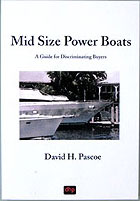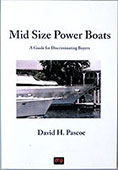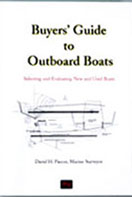Chapter 10
The Engine Room
Table of Contents
Engine Room Access & Serviceability
All About Engine Hour Meters
Gas Engine Longevity
Diesel Engines
Propellering
Ventilation
Things needed frequent servicing
Sizing Up Condition of Used Boat Engines
Water and Oil Trails
Engine Rust
Sources of excessive engine room corrosion
The Drive System
Engine Mounts
Vibration Problems
Exhaust Systems
Diesel Engine Risers
Mufflers
Gas Engine Risers
Other Quick Checks
The Cooling System
Look Under the Engines
Shaft Seals
Installation of Other Components
Fuel Filters
Fuel Lines
Fuel Tank Vents
Batteries
Water Heaters
Battery Chargers
Insulation
Excerpt
In this chapter I provide enough information for just about anyone to perform their own survey. That, however, is not my main purpose which is to arm you with more than enough information to size up any used boat that you may be looking at and rather quickly decide whether you wish to make an offer on it.
Of course you can also use it to counsel your surveyor on specific points you might like him to check or give emphasis to.
Like the kitchen of a house, the engine room is the most expensive part of the boat with the components located there involving up to one-half of the boat's value, particularly when diesel engines and generators are involved.
The engine room is also the one area of the boat that a majority of boat owners least like to get involved with. After all, we see boat owners happily cleaning all other areas of their boats on Saturday morning, but how often do we ever see anyone cleaning the engine room?
Judging by the appearance of most used boats, the answer is never. This is where we begin to discover that large boats aren't quite the casual recreation the marketing people would have us believe. After all, we're dealing with sophisticated machinery and electronics here, stuff that ought not to be approached casually unless one has buckets of money.
Most likely this is because the buyer has little knowledge about machinery or systems. If that happens to be you, I'm not proposing to make an expert of you, but do suggest that you not be intimidated by what you might see.
So drag your body down there and have a look around. And since you use common sense in everything else you do in life, you can apply it here as well.
Regrettably, most boat builders take the same view of the engine room (or compartment, as the case may be). They know that the layout, neatness and general access for service does not sell boats at boat shows and so the engine room simply becomes a place to put stuff with little regard for how it is done.
Typically making it as small as possible so as to create larger living spaces, the machinery is usually crammed in like sardines in a can. However, this general disregard begins to change as boats get bigger and more costly. Sport fishermen tend to be an exception.
A very simple rule of thumb can be applied here; if things don't generally look good, then they probably aren't. But before we get into details, let's consider engine room layouts.
For a very long time boat builders paid no attention to whether anyone could reach something in order to repair or service that something. They'd just take all the machinery and systems and cram them into as small a space as possible so that they could give mom the spacious interior she desires.
- A Guide to Discriminating Buyers
by David H. Pascoe
Soft Cover
512 pages
Publisher: D. H. Pascoe & Co., Inc.
Published: 2003
Language: English
ISBN-10: 0965649636
ISBN-13: 9780965649636
In Stock
David Pascoe - Biography
David Pascoe is a second generation marine surveyor in his family who began his surveying career at age 16 as an apprentice in 1965 as the era of wooden boats was drawing to a close.
Certified by the National Association of Marine Surveyors in 1972, he has conducted over 5,000 pre purchase surveys in addition to having conducted hundreds of boating accident investigations, including fires, sinkings, hull failures and machinery failure analysis.
Over forty years of knowledge and experience are brought to bear in following books. David Pascoe is the author of:
- "Mid Size Power Boats" (2003)
- "Buyers’ Guide to Outboard Boats" (2002)
- "Surveying Fiberglass Power Boats" (2001, 2nd Edition - 2005)
- "Marine Investigations" (2004).
In addition to readers in the United States, boaters and boat industry professionals worldwide from over 70 countries have purchased David Pascoe's books, since introduction of his first book in 2001.
In 2012, David Pascoe has retired from marine surveying business at age 65.
On November 23rd, 2018, David Pascoe has passed away at age 71.







Normally orders ship the same day, if placed before 12:00 PM Eastern time.